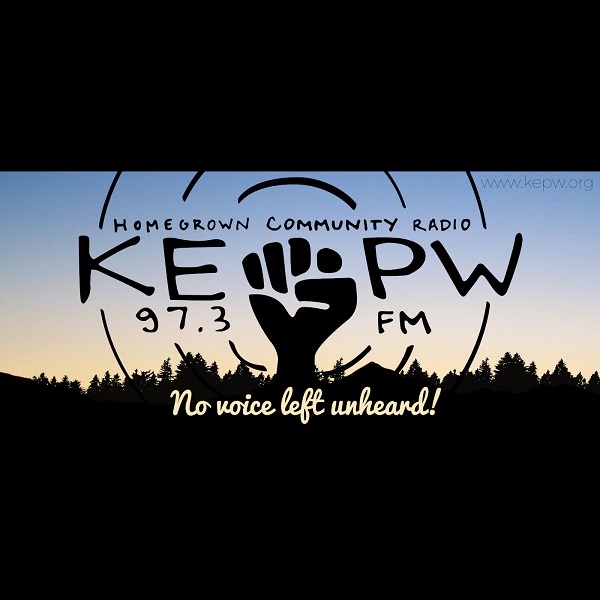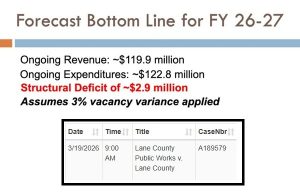Advocates report camps ‘aggressively swept’ during the World Athletics Championships
6 min read
Homeless in Eugene? Please get involved
Julie Lambert: Last week we had as a guest speaker on the show, we had activist-at-large R Self who is a member of many civic-minded groups, including the Poverty and Homelessness Board Work Group, the Lived Experience Advisory Group for Unhoused Engagement (LEAGUE), the Coordinated Entry Committee and the Shelter Stakeholders Committee. Welcome to the show, Richard, we’re glad to have you here.
[00:00:27] R Self: Thank you so much. I’m glad to be back.
[00:00:30] Julie Lambert: Okay. And the reason why I wanted you to come on today is I would like to have an umbrella—if you will—description of what things are going to look like, especially when we run out of funds, such as ARPA, which I can let you explain.
[00:00:57] R Self: Well, thank you. Yeah, that’s a big concern of mine. There has so far been allocated $8.1 million for the furtherance of the Safe Sleep sites and the other Rest Stops and so forth through July of 2024.
[00:01:21] But as you stipulate, those are American Rescue Plan funds. Those are one-time-only funds. Those will last until they last. And once we exhaust the $8.1 million from one-time funds, then it’s, Where we need to go from there. And I don’t think yesterday was too early to start thinking about all of that.
[00:01:52] So, where will this come from in the future? How supportive will the community be in continuing these situations—rather than having those who have nothing sleeping on somebody’s business porch or other unfortunate things like that, that do happen, and are still happening—because we’re only serving right now about 500 – 550 people out of some 3,500 a month that we know of through the Homeless by Name List.
[00:02:30] So where we go from there is not only up to the civic groups that I help, be a part of and vote on. But what does the community, what does the business community, what does the regular average homeowner want out of all of this? What do they want this to continue? Or do we want to revert back to parks and that, being overwhelmed with a situation because we cannot continue funding. So I would hate to see any of that.
[00:03:04] Julie Lambert: Yeah. They weren’t even able to contain our unhoused folks for the World Games, which they were—the people that I was aware of anyway—that were camped out very close to where the World Games were, were being swept and aggressively swept. That was the information that I received. Do you have a comment on that, having the World Games here and having our unhoused population have to be displaced to accommodate them?
[00:03:38] R Self: That’s not something, having experienced it myself, is not unusual. And they do that on a regular basis every spring anyhow—so it’s called ‘Spring Cleaning’ and it always happens.
[00:03:51] However, what’s interesting is Kelly McIver, the homeless spokesperson for the city, says that nothing was going to change and they were doing no unusual arrangements to deal with the homeless that they would normally not do, which is halfway true and halfway BS.
[00:04:13] So (yeah), they are displacing people. They are displacing people and they are doing that because of these Games. And I’m sure that that’s the whole idea, because again, we’re not serving the entire homeless community through our programs. (No)
[00:04:33] Julie Lambert: No, we’re not. Now, going back to what you had mentioned earlier about the business community and the homeowners community, I understand the Chamber of Commerce has taken an interest in working with the homeless instead of just fielding complaints about them. Would you like to talk about that?
[00:04:58] R Self: Well, real quickly, it’s just the Chamber of Commerce has tried to get the business community to do other things besides just file complaint after complaint after complaint, saying something to the effect:
[00:05:13] If we don’t do something, then as a business community, then we’re never going to get our way out of this situation just by complaining.
[00:05:22] This is not going to be solved by law enforcement anyway, any more than it was 10 years ago or 10 years before that, or 10 years before that. And it’s not going to be solved by law enforcement today and even law enforcement knows that.
[00:05:38] So, this comes down to, in the long run, there is housing coming through both the Housing Implementation Pipeline, with (?) ventures to build some 6,000 affordable units in this area. And there may be more coming as far as the county is concerned. So housing is coming, but this won’t be alive and well until 2027.
[00:06:04] I would also ask that maybe our community members who are not aware, especially those of you who are of different ethnicities and different backgrounds, to become part of these civic groups, such as the Lived Experience Advisory Group, the Shelter Stakeholders Committee, the Human Rights Commission’s Homeless and Poverty Work Group, the Coordinated Entry Committee.
[00:06:34] These are all out to make changes for the better in our system that will hopefully serve the people or help the people we’re supposed to be serving rather than just scoring them and denying them.
[00:06:50] Julie Lambert: Yes! And I think that that’s a great idea. We’d like to have more civic engagement and I would like to add that you don’t have to have experience to become involved. You just have to care enough to resolve the situation.
[00:07:06] So if you’re angry about the unhoused population, that’s a good reason to go, if you are willing to channel that anger into solution, and let your anger not be the thing that holds you back, but take that anger and turn it around and be active in solving it so that some of that anger can dissipate.
[00:07:29] R Self: Be a voice for those who have no voice.
[00:07:32] Julie Lambert: Well, thank you, R Self. We appreciate having you here. And is there one last thing that you would like to say to reach out and speak to our community?
[00:07:44] R Self: Well, we’re also asking those who are unhoused to do this as well. If you’re unhoused and you’re hearing this, we’d like to hear from you so that we can help serve you better. So you’re part of the unhoused community, you’re very much a candidate to be part of LEAGUE or any of the other committees, civic groups, any of those would love to have your input.
[00:08:11] So please do even go to the Lane County courthouse to get information if you’d like to, or some way, but become involved because then you’ll have a voice and it will be yours.
[00:08:29] Julie Lambert: Yes, and if you don’t want to poke around on the website, you can simply drop an email.
[00:08:37] R Self: Staff@KEPW.org. That’s Staff@KEPW.org. We’ll provide you links via those and we’ll respond as quickly as possible.
[00:08:54] Julie Lambert: Thank you. And I want to give one last shout-out for the Lived Experience Advisory Group. That group consists of people that are unhoused or formally unhoused, so that would be a group that would be—we would love to have you. We appreciate diversity and if you would like to come and join us to help have some influence on how the laws and ordinances are made here, at least make recommendations, then that would be a group where you could get started.
[00:09:28] Thank you for joining us this morning. This is Julie Lambert reporting for KEPW 97.3 FM, Eugene’s Resistance Radio.





